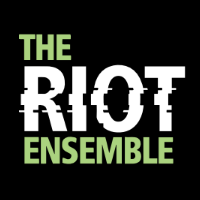A few moments with Drew Schnurr
The Riot Ensemble has had a busy month of May – from an outdoor performance of Workers Union (to which the police were called!) to Vox Balaenae and the UK premiere of Djuro Zivkovic’s I Shall Contemplate… on the Platnauer Concert Series at Brasenose College, Oxford.
Next week, though, is where we really get going. Our Les Citations project, programmed in memory of Henri Dutilleux, will feature an array of premieres from around the world.
One of the furthest afield comes from Los Angeles-based composer Drew Schnurr whose new piece Linda’s Wake sets a libretto by Richard Sparks. It was my pleasure to ask Drew a few questions about Linda’s Wake, and his work in general. Drew will be with us at both Les Citations concerts so look for him if you’ve got any further questions on what he says here!
Aaron HN: Thanks so much for being with us Drew. We can’t wait to give the world premiere of your work Linda’s Wake, which you wrote with librettist Richard Sparks. Can you tell us a bit about your work with Richard, and how you collaborated on this piece, specifically?
Drew Schnurr: First, I want to say how excited I am for the opportunity to work with the Riot Ensemble on this project. I had a great experience working with Richard last year, so when the commission came in I knew right away I wanted to ask him to be involved. I was happy he said yes. He took a few weeks and wrote the text specifically for this piece. I had no idea what he would be coming back to me with, and was blown away when I read the text for the first time. He had built a mountain for me to climb.
AHN: Setting text is always a particular challenge for composers, and Richard’s libretto sets some specific challenges for you as it moves in and out of rhymed verse. Was this a decision you guys made together, and how did you approach the different formal styles within the text?
DS: You’re right. For me, Richard’s treatment of text and narrative is almost cubist—constructed periods of formally rhymed verse adjacent to more freely flowing structures. These correspond with abrupt intersections of time, place, and emotion within the narrative. All his conception. It did make the text a challenge to set. It would have been easy to do in musical abstraction, but my intention with this piece has been to support the heart of the protagonist’s (the soprano’s) story while also keeping the work interesting musically. One way I did this was to try to think of the text itself—inflections, rhythms, and formal structures—as musical material that can compositionally developed “as music.” This gave me some of the flexibility I needed to make the whole thing work.
AHN: You were a professional contrabass player yourself for many years – and indeed there’s a contrabass in Linda’s Wake. How do the experiences you had as a performer effect your composing today?
DS: It’s another layer. I spent many years cultivating my skills as a performer and then working professionally. I personally feel one danger of the performer turned composer is that the “performer” can take over in the creative process which can narrow the range of compositional expression. When I turned my focus to composition some years ago, I worked consciously to try to bring my compositional technique to the same level I had achieved as a performer. It took some time, but I finally feel these two aspects of my musical DNA as being integrated and working well together. I wouldn’t have it any other way. When composing, I’m always conscious of how it would “feel” to perform the music within the ensemble, which I feel is of tremendous benefit to my process.
AHN: In addition to being the world premiere of Linda’s Wake, this will be the first UK performance of your work. We live in such a globalised society, yet contemporary music is often a very local phenomenon. Could you tell us a little bit about the contemporary music scene where you live (Los Angeles) and what you’re looking forward to in working in England?
DS: One of the distinctive traits of the new music scene in Los Angeles is it’s diversity. I’ve always been very attracted to that—both for how it stimulates creativity in my own work and for the freedom it allows. It’s rare. And we are experiencing a kind of surge here. New music series are sprouting up all over. Many of my L.A. composer colleagues have re-located recently from other parts of the U.S. traditionally considered more “happening” in terms of contemporary music. People recognise something significant is happening here. I’m very excited to be having my UK premiere. London continues to be so important to what is happening in new music today, and my musical encounters in London are always inspiring. I’m really looking forward to working with the Riot Ensemble for this project!
AHN: Well we’re very much looking forward to working with you, too, Drew. As we sign off, tell us what other projects do you have coming up in the year ahead?
DS: It’s going to be busy. Work wise: I have a documentary film that I scored coming out this summer, along with a couple of other films in the pipeline. UCLA also hired me this year to develop a new curriculum in “sonic arts” at the Herb Alpert School of Music so I’ll be busy with that this fall. On more personal artistic fronts: Richard Sparks and I are planning another project, and I’m also working on a series of piano etudes. Any day composing music is a good day. I plan to have many more of those this year!




